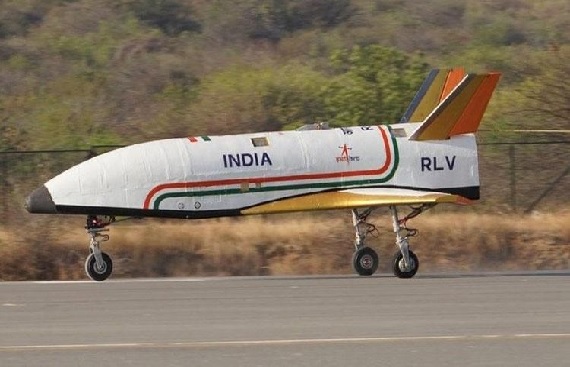ISRO Takes Significant Step Toward Realizing Indian Space Shuttle 'Pushpak'
By
siliconindia | Friday, 22 March 2024, 09:27:47 AM IST

India progressed further in its attempt to realise a reusable launch vehicle (RLV)/ rocket named 'Pushpak' by successfully test landing RLV LEX-2 at the Aeronautical Test RIndia took a significant leap forward in its pursuit of a reusable launch vehicle (RLV) with the successful test landing of the RLV LEX-2, dubbed 'Pushpak', on Friday at the Aeronautical Test Range (ATR) in Karnataka's Chitradurga. Conducted by the Indian Space Research Organisation (ISRO), the test showcased the RLV LEX-2's autonomous landing capability from off-nominal initial conditions following release from an Indian Air Force helicopter at an altitude of 4.5 km.
Pushpak demonstrated its autonomous navigation and control by approaching the runway from a distance of 4 km, making cross-range corrections en route. The spacecraft executed a precise landing on the runway, employing its brake parachute landing gear brakes and nose wheel steering system to come to a halt, as confirmed by ISRO.
This marked ISRO's second successful test landing of an RLV, validating its indigenous technologies in navigation, control systems, landing gear, and deceleration systems crucial for high-speed autonomous landings of space returning vehicles. The mission, which simulated high-speed landing conditions, reiterated ISRO's capability in reusing flight hardware and systems.
Structural enhancements were made to RLV-LEX-01 based on lessons learned from the first test landing. The collaboration involved ISRO's Vikram Sarabhai Space Centre (VSSC), Liquid Propulsion System Centre, and the ISRO Inertial Systems Unit, along with various government agencies.
Dr. S. Unnikrishnan Nair highlighted that ISRO's repeated success indicates progress in mastering terminal phase maneuvering, landing, and energy management in fully autonomous mode, crucial for future orbital re-entry missions.
The mission's success was attributed to the expertise of the team led by key figures such as Sunil P., Programme Director of Advanced Technology and Systems Programme at VSSC, J. Muthupandian, Project Director of RLV, the Mission Director, and B. Karthik, Deputy Project Director of RLV, who served as the Vehicle Director for the mission.
The accomplishment underscores India's growing prowess in space exploration and its commitment to developing cutting-edge technologies for space missions. With each milestone, ISRO advances closer to realizing its vision of cost-effective and sustainable space transportation, laying the groundwork for future endeavors in space exploration and satellite deployment.
Read More News :
Schneider Electric to Invest Rs 3,200 Crore in India Manufacturing Hub
Mahindra partners with Adani Total Energies to boost EV Charging

.jpg)
.jpg)
.jpg)